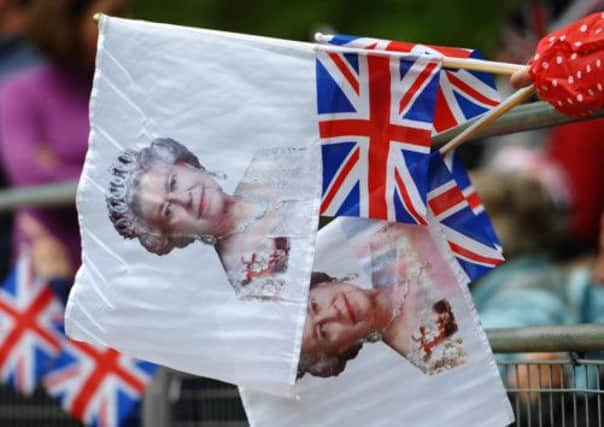Post-Olympics and jubilee, this kingdom still isn’t united


IF ever there was a moment for Britain to come together as an interwoven nation of brotherly Scots, Welsh and English, surely 2012 provided that moment.
First the Queen’s diamond jubilee, then the London Olympics and, finally, the equally inspiring Paralympics.
Advertisement
Hide AdAdvertisement
Hide AdLast summer delivered three months of frenzied flag waving and choking nationalistic sentimentality which ought to have united the kingdom like never before.
But, exactly a year after this pinnacle of patriotism, a new report by the Institute of Public Policy Research appears to indicate the opposite.
While most English people relentlessly flew the union flag from June to August, few of us felt genuinely dedicated to the union itself.
The centre-left think tank’s findings in the Future of England Survey, which was run in conjunction with Cardiff and Edinburgh Universities, showed that virtually no one felt more British.
Advertisement
Hide AdAdvertisement
Hide AdMost people felt English and British, more felt they were entirely English too.
“I think the sense of erosion and decline of certain British institutions has sped this process up,” says Guy Lodge, associate director of the IPPR. “We no longer have the British Empire, nationalised British industries, a strong sense of shared faiths, even a British NHS. There are fewer and fewer things which join us together in the long term.
“And all this has happened at a time when people living in Wales and Scotland have been reassessing their own national identity. As they are seen to move away, with their own assembly and parliament respectively, I think English people are also reassessing their Englishness.”
Given the waves of nationalistic good feeling which swept over the country last year, it will come as a surprise to learn that English people feel less British than they might once have felt.
Advertisement
Hide AdAdvertisement
Hide Ad“Don’t get me wrong, I don’t believe the jubilee and Olympics were somehow an attempt by the government to orchestrate a stronger sense of Britishness,”says Mr Lodge. “But if there was ever a moment when we might have felt more British, then that would surely have been it. However, it just didn’t happen.”
A clear majority of people living in England retain a dual sense of identity: they think of themselves as both English and British. Crucially though, they do not think of themselves as equally English and British.
According to the study, 20 per cent of those polled say they are “more English than British”, more than double those who say they are “more British than English”. More than twice as many people prioritise their English over their British identity: 35 per cent said they were either “English not British” or “More English than British”, compared to just 17 per cent who claimed either to be more “British than English”’ or “British not English”’.
But these findings come as no shock to the IPPR who have been observing this movement for some time. Nor are they a shock for countless other polling organisations who have registered a similar change in recent decades.
Advertisement
Hide AdAdvertisement
Hide AdThe 2011 Census found that 70 per cent of the English population identified themselves as either solely English or English in combination with some other national identity. Just 29 per cent of respondents identified themselves as feeling any sense of British national identity.
Mr Lodge says: “It’s a slow but subtle shift which has been going on for around about 20 years or so. Exactly why it’s happened or exactly when it started we can’t be certain, but there’s almost certainly a shift there.”
The shift was observed in all age-groups, classes and genders, but the one exception to the rule was those people polled who hailed from ethnic minority groups.
“People in this group tended to identify with Britishness far more than Englishness,” says Mr Lodge. “Perhaps because they associate a heightened sense of Englishness with some of the more far right nationalistic tendencies in this country. But even among this group there were some signs of a change.
Advertisement
Hide AdAdvertisement
Hide Ad“And I think, in general, most people in England now feel less self-conscious about talking about their Englishness. I think there was a sense that this was an area of life which had almost been hijacked by the far right, but there’s a sense that most of us have wrestled that back and don’t feel too worried about openly discussing patriotism any more.
“This is perhaps another contributory factor to the admission that more English people feel largely English.”